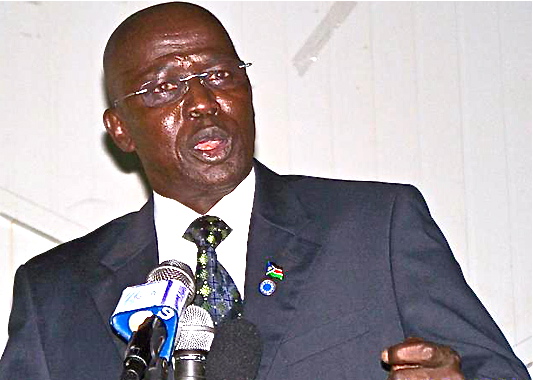Upper Nile governor calls for “fair” mediation over border conflict with Sudan
April 30, 2012 (MALAKAL) – The Governor of South Sudan’s Upper Nile State, Simon Kun Puoch, on Monday called for “fair” mediation over the border conflict with neighbouring Sudan, stressing that the value of peace cannot be underestimated.

Over the last month Sudan and South Sudan have fought over Heglig, a disputed oil-producing territory on their shared border. The fighting caused Khartoum to cancel a trip by Sudan’s president to Juba to sign deals on security and the rights of nationals living in the other’s country.
South Sudan seceded from Sudan last year as part of a peace deal that ended decades of conflict but the two sides have been unable to agree on a host of post-partition issues including oil, demarcating the border and the status of disputed areas such as Heglig and Abyei.
As well as conflict around Heglig, which South Sudanese forces managed to occupy for 10 days, the two countries have engaged in concerted diplomatic and media efforts to argue that the other was the aggressor. They have also given widely different figures on the numbers killed in the fighting.
South Sudan said that its occupation of Heglig was triggered by land and air attacks on Unity State by the Sudan Armed Forces (SAF). Despite bombing raids being witnessed by international and South Sudanese journalists, and receiving strong condemnation from the UN, Khartoum continues to deny responsibility.
Governor Puoch, said that Sudanese president Omar Hassan al-Bashir has repeatedly and publicly preached war against the South Sudan, protesting against his description of the country’s administration as “insects” who must be taught a lesson.
He contrasted this with South Sudan’s president Salva Kiir – who initially ignored international calls to withdraw from Heglig – who Puoc said was working towards peace between the two countries.
Analysts have pointed out, however, that Bashir’s comments are probably intended for internal consumption to garner support and galvanise the military’s recruitment campaign and are unlikely to represent Sudan’s real position when the two sides resume talks. Bashir has said, for example, that the South would never be able to resume exporting its oil through Sudan.
The transit fees were a key pillar of Sudan’s budget until South Sudan stopped production, accusing Khartoum of confiscating its oil when they could not agree on how much the South should pay for each barrel exported.
The African Union has released a road map for the two sides to resolve issues over oil and other issues within three months. Juba has said it is ready to return to the talks in Addis Ababa but Khartoum has said that first South Sudan must admit it is backing Sudanese rebel groups and that security must addressed first.
Juba denies backing rebels in South Kordofan, Blue Nile and Darfur – which are trying to overthrow Bashir’s government – and responds that Khartoum supports rebels in Upper Nile, Unity and other states. Bashir has threatened to overthrow the Sudan People’s Liberation Movement (SPLM) in Juba.
“Those perpetrating this conflict should know that the solution to the dispute over pending issues is not a military option, but instead a problem to be solved at the negotiating table”, Puoc said.
“Sudanese president Bashir and his group in the National Congress Party should bear in mind that government of the republic of South Sudan was an elected government by the people of this country and that it has an obligation to build, defend, protect and promote the integrity and fundamental human rights of the people of our people”, Puoc said.
“We will therefore never accept being killed or allow their properties to be looted or allow an inch of its territory to be invaded”, said Puoch. South Sudan has warned that should SAF attacks continue after it pulled out of Heglig it would have no choice but to respond.
The Governor said that Bashir should behave more like Kiir and act as an agent for peace, rather than making emotive statements.
In his meeting with members of the South Sudanese Diaspora, Puoch urged them not to emulate the “egotistical” way that Sudanese diplomacy is carried out when interacting with officials in foreign countries.
He said that South Sudanese were known for “speaking the language of truth and standing against injustices.”
Last week South Sudan’s Vice President Riek Machar said that Juba had performed badly in the diplomatic battle over the status of Heglig. The UN described the actions of South Sudan’s army (SPLA) as illegal and they were widely criticised, even by the nine-month-old country’s traditional allies.
Pagan Amum is attending various events in London on Tuesday as part of the SPLM’s campaign to get Juba’s narrative better understood in the international community.
Puoch said: “The Diaspora must take a leading role in shaping the way the government in Khartoum has described us in the international politics. You must be seen to be good ambassadors of peace, promoting and defending ideals of peaceful co-existence in the region.”
He pointed out that his country holds no grudges against Sudanese people living in his state, which borders Sudan. Puoc said he would respect the rights of Sudanese citizens living in his state.
“The value of peace towards achieving lasting sustainable development cannot be underestimated, though what is happening now can clearly be described as the state of war which I think is not in the best interest of the two countries.”
As well as the humanitarian and human costs, the conflict has meant that both nations are loosing out on the oil revenues that are essential both economies.
Before the January shutdown, oil revenue accounted for 98% of South Sudan’s budget. The stoppage of production in Heglig has resulted in Sudan loosing out on around half its 115,000 barrels a day of oil production.
(ST)
